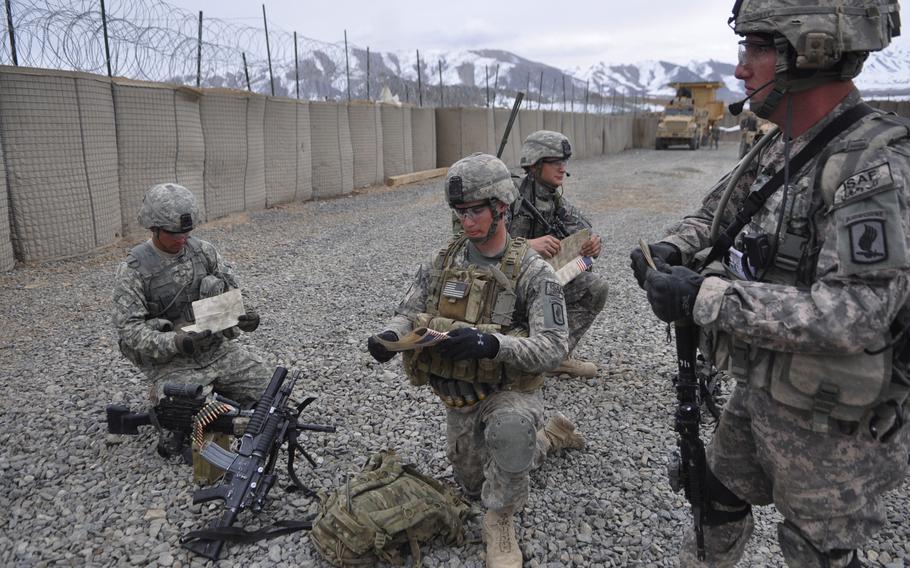
Soldiers with the 173rd Airborne Brigade’s B Company pack their "blood chits," a request for shelter that is translated into several languages in case of separation from the unit, before an air assault mission in Wardak province, southwest of Kabul. The company is working to make inroads with local villagers before the traditional summer fighting season. (Heath Druzin/Stars and Stripes)
KHANJANKHEL, Afghanistan — Spring has come early to Wardak province, in the form of unseasonably warm weather and an early awakening of the Taliban from its annual hibernation.
And U.S. soldiers are preparing for what local residents are warning could be the bloodiest fighting season yet.
Soldiers from the 173rd Airborne Brigade’s Company B, 1st Battalion, 503rd Infantry Regiment stationed at Combat Outpost Nerkh haven’t fired a shot in their nearly 3-month-old mission. Instead, they have been trying to make inroads with traditionally hostile villagers to the west of their small, tented compound, itself just west of the provincial capital, Maidan Shahr. The 173rd’s predecessors set up a patrol base last summer in this collection of mud-brick buildings bisected by a bustling bazaar. It was under attack for all 12 of the days it was open and the Army scrapped the project.
The 173rd soldiers conducted an air assault Wednesday, hunting Taliban members who had reportedly threatened and roughed up villagers and kidnapped two recruits for a local U.S.-backed militia in Khanjankhel. The soldiers ended up conducting an impromptu meeting with village elders.
The chill of winter permeated the talks. Villagers unleashed a litany of complaints to Capt. Kirby Jones and made clear they were unwilling to help, while not looking to do the Americans harm. One villager was blunt: “If you guys live through the summer, then you will be strong. You will have discipline.”
But Jones has seen some cooperation in friendlier villages east of Kahnjankhel: Already villagers have led his soldiers to two roadside bombs and a rocket stashed in a field — no small issue in an area where the last unit had nine soldiers killed by bombs.
It’s those small victories, coupled with development projects and informal meetings with local citizens, that will turn the tide in places like Wardak, said Jones, who has served previous tours in hot spots such as Baqouba, Iraq, and Paktika province, Afghanistan.
“I don’t think it’s going to be some high-level decision that changes hundreds of years of how Afghans have done business,” he said.
Jones said he is using the “model village concept,” showing villagers from the hostile western portion of the district the school, road and water projects that have come to the eastern end of the district, where U.S. and Afghan forces find much more support. But he knows he can do only so much in a short period of time and expects a lot of fighting when the snow melts.
As the Khanjankhel visit illustrated, getting local citizens to buy into American efforts in an area long averse to any outside authority, Afghan or otherwise, will be difficult. The villagers are angry that a local mullah was detained, and they complain that they have received none of the civil projects bestowed upon their neighbors in the more peaceful eastern part of the district.
Jones counters that the villagers must help U.S. and Afghan forces bring security to the area, and points to a series of wells in the village as proof that they have gotten some international assistance.
“Those were from the Taliban regime,” an elder said.
Despite the cool reception, Jones said he sees some hope. By sitting on the fence while the area is still contested, he said, the villagers are simply being pragmatic and perhaps can be swayed by civil projects and a more permanent troop presence in the area.
Many villagers around Nerkh district report the Taliban is threatening death to anyone who participates in a long-planned peace jirga — an assembly of leaders — and even friendly villagers, such as an elder in relatively peaceful Kane Izat, asks the U.S. soldiers to lower their profile for fear of retribution.
“It’s not good that you guys are walking here every day,” he said. “It would be better if you called (for information). We’ll be in trouble because in the west (a Taliban stronghold), all the people are angry with us.”
It’s the first time the 173rd soldiers had heard such a request in the village.
“It’s already starting,” Jones said of the Taliban moving back into the valley and conducting intimidation campaigns.
As a way to counter Taliban media, U.S. forces have been funding and equipping a local radio station that beams a mix of music, news and highlights of coalition and Afghan government achievements across the district, pushing out even into the far reaches of the lawless west. The radio station is immensely popular in the area, so much so that Taliban members have even taken to calling in to give their two cents. Jones credits the local disc jockeys with improving relations between U.S. and Afghan forces and residents.
But having a high profile can be dangerous. Jones recently heard that the station’s leading personality, who goes by the alias Maiwand Tanha, is planning to quit after a frightening run-in with fighters he believes are aligned with insurgent leader Gulbuddin Hekmatyar. Tanha was stopped at a checkpoint, blindfolded and held for eight hours before being released.
“I wanted to call my family because I was 100 percent sure they would kill me,” he said. “Everybody considers this year will be worse than the last.”